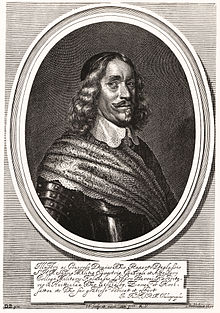Robert Douglas, Count of Skenninge
|
Count Robert Douglas |
|
|---|---|
 |
|
| Born |
17 March 1611 Traprain Law, Scotland |
| Died | 28 May 1662 (aged 51) , Sweden |
| Allegiance | Sweden |
| Years of service | 1630–? |
| Rank | Field marshal |
| Battles/wars |
Battle of Breitenfeld Battle of Jankau Siege of Warsaw |
Robert Douglas (17 March 1611 in Standingstone Estate, by Traprain Law, East Lothian – 28 May 1662 in ), Count of Skenninge, Baron of Skalby, was a Scottish cavalry general during the Thirty Years' War rising to the rank of Field Marshal (1657–1662) in the Swedish-Polish wars that followed.
His father, Patrick Douglas, was the second son of William Douglas of Whittinghame.
Scotland's numerous kindreds were often mounted warriors by tradition, training and capability, particularly those from the Northeast of Scotland and the Scottish Borders. The Douglas family were one such family. Many Scottish soldiers, infantry and cavalry, found themselves engaged in the various wars that are collectively called the Thirty Years' War and Robert Douglas was one of these. In 1627 he was received as a page in the Swedish service under John Casimir, Count Palatine of Kleeburg, castellan of Stegeborg Castle, brother-in-law of King Gustav II Adolf.
In 1630, when Sweden joined the Thirty Years' War, Douglas followed the main army into Germany (where he joined the German literary society Der Fruchtbringenden Gesellschaft). Although a competent military commander, he only began to earn some notoriety in the aftermath of the Peace of Prague (1635). Then serving as a lieutenant colonel, Douglas had been tasked with the defence of Egeln in Saxony, and so was left very much within the territory of the newly hostile Elector Johan Georg who had defected to the Empire. Douglas spectacularly broke out rather than change sides and managed to return with most of his men through hostile lines to Swedish controlled territory He participated in the the following year, now with the rank of full colonel and actually in command of two cavalry regiments. With these he participated in the famous flanking charge led by Lieutenant General James King, the senior cavalry commander in Alexander Leslie's Army of the Weser.
...
Wikipedia
